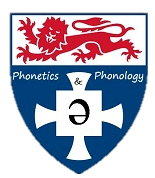-
News:
Accent Articulation Conference First Language Acquisition gamification Group focuses Job Laboratory Phonology Lecturer Linguistics Morphology Perception PhD Funding Phonetics Phonetics and Phonology Phonology Professor Project on Tyneside English Psycholinguistics R Research associate science open day Sociolinguistics Sociophonetics Speech Signal Analysis Speech signal processing statistics Workshop
Tag Archives: Phonology
Melissa Baese-Berk’s Talk
Date: 06/12/2021 Prof. Melissa and her colleagues and students are constantly productive in the research of speech processing as well as accent perception and adaptation. In her talk, she walked us through their new work on the adaptation to unfamiliar … Continue reading
Job: Lecturer/Senior Lecturer
For current researchers in this area at the university you can see the Phonetics & Phonology research groups people page.Posted date: 06-Dec-2021Closing date: 10-Jan-2022 More Information Full job description can be found at here. The Role The School of Education, Communication and … Continue reading
Job: Research Assistant (Laboratory Manager)
For current researchers in this area at the university you can see the Phonetics & Phonology research groups people page.Posted date: 23-Nov-2021Closing date: 7-Dec-2021 More Information Full job description can be found at here. The Role The School of Education, Communication and … Continue reading
Lecturer Position in Phonetics & Phonology
The School of English Literature, Language and Linguistics wishes to appoint an outstanding scholar and teacher as a Lecturer in Phonetics and Phonology. Deadline – 7th July 2019 Candidate You will have a PhD, either in hand or near completion, … Continue reading
Teaching Fellow Position in Phonology
The School of English Literature, Language and Linguistics wishes to appoint an outstanding scholar and teacher as a full-time teaching fellow in phonology for 12 months fixed-term, to start 15th January 2019. https://www.jobs.ac.uk/job/BOG623/teaching-fellow-in-phonology-b172223a Candidate You will have a PhD, either … Continue reading
Posted in Job Vacancies
Tagged Job, Morphology, Phonetics, Phonology, Sociolinguistics
Leave a comment
Research Group Meeting 08 Nov 2018 – Ebtehal Asiry & Jane Stuart Smith
Last week we were very privileged to host Ebtihal Asiry and Jane Stuart-Smith at our research group meeting. Ebtihal presented on “Investigating phonological variation in the English of Iraqi Arabs in two UK cities: London and Glasgow” (slides here), her … Continue reading
Journal of Phonetics VOT special edition
Off the back of their success in winning the Peter Ladefoged Prize at BAAP 2018, Jalal and Ghada have now had their work on VOT of Arabic stops published in the Journal of Phonetics special edition ‘Marking 50 Years of … Continue reading
Phonetics and Phonology on tour… #BAAP2018
On 12-14th April 2018 a number of us from the Phonetics and Phonology Research Group went to the BAAP 2018 Colloquium at the University of Kent. We had 5 posters (Dan, Wael, Hajar, Hana, Nief) and 3 talks (Jalal & … Continue reading
Posted in Conferences
Tagged Conference, Laboratory Phonology, Phonetics, Phonology, Sociolinguistics
Leave a comment

